#rūm
Explore tagged Tumblr posts
Text
anybody got a link to that post about how the Ottomans bravely liberated the oppressed Muslim majority of the Holy Roman Empire
401 notes
·
View notes
Text
Reblogging because A: I agree and B: the Notes are Informative!
see one of my problems w movies n tv shows is that they often show a character of like a scientist or a historian and try and make them extremely boring but that shit just doesnt work on me. theyll b like 'well in 13th century turkey...' n everyone will b like ughhh shut up professor dinglebarry no one cares and like. well excuse me. stop the movie. id like to hear more about 13th century turkey.
25K notes
·
View notes
Text
Allāh ﷻ reminds us;
“So be patient. Indeed, the promise of Allāh is truth.”
- [Surah Ar-Rūm 30:60]
Your silence in hardship is not unnoticed. Your tears are not in vain.
Hold on a little longer—what you seek is on its way, by His will.
134 notes
·
View notes
Text
history of Byzantium re-listen has gotten to Nikephoros I, let’s fucking go
71 notes
·
View notes
Text
Samonas
i want that twink dealt with but not necessarily destroyed as i may have use for his conniving eunuch ways later
16K notes
·
View notes
Text
I really like the hymn Alma Redemptoris Mater because it's in dactylic hexameter for no reason
somebody in the 11th century (possibly Hermann of Reichenau) just decided to get funky with it
unless my ear for rhythm is worse than I thought, I don't think I've ever heard a setting of it that draws much attention to the metre
that being said, here's Palestrina anyway:
youtube
the scansion:
Pōrta ma/nēs ēt/ stēlla ma/rīs sūc/cūrre cad/ēnti
Ālma Re/dēmptō/rīs Mā/tēr quae/ pērvia/ caeli
Sūrgere/ quī cū/rāt popu/lō tū/ quae genu/īsti,
Nātū/rā mī/rānte tu/ūm sānc/tūm Genit/ōrem
Vīrgo pri/ūs āc/ pōsteri/ūs Gabri/ēlis ab/ ōre
Sūmēns/ īllud A/vē pēc/cātō/rūm miser/ēre
the fifth line is a little odd but I think that's the only way it works
tbh I have no idea how much 11th century monks knew about Latin vowel length
there's also no elision, which could be a coincidence or they just didn't wanna go there lol
9 notes
·
View notes
Text

Be patient! Indeed, the Promise of Allāh is true and let not those who are devoid of certainty discourage you from conveying (the message).
[Al-Rūm, 30:60]
35 notes
·
View notes
Text
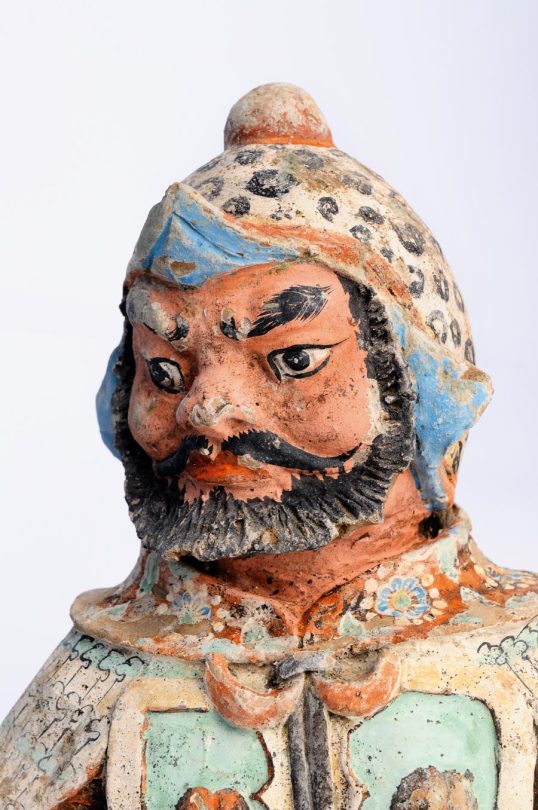
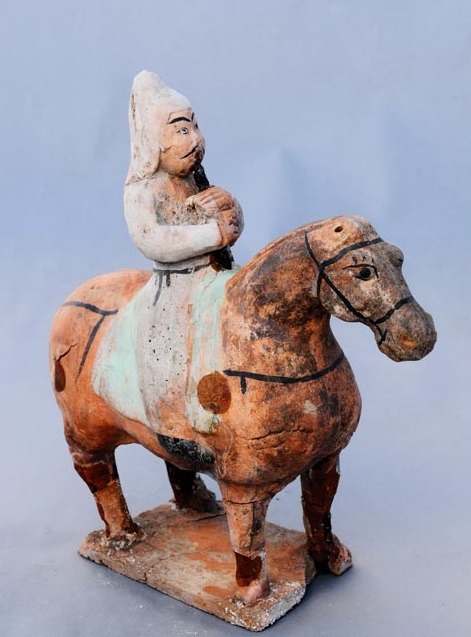

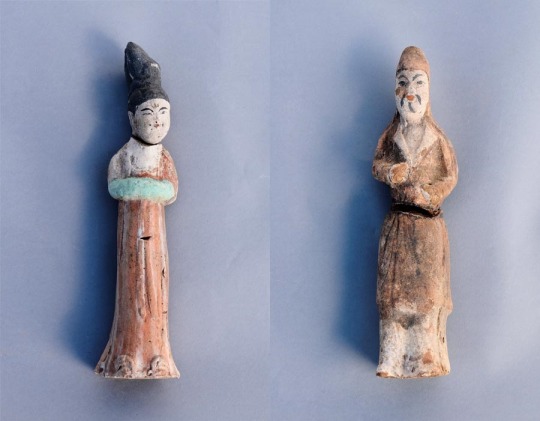
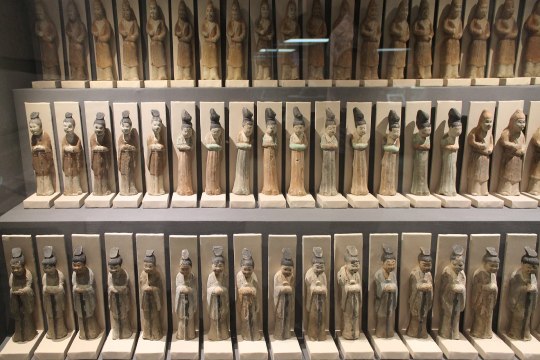
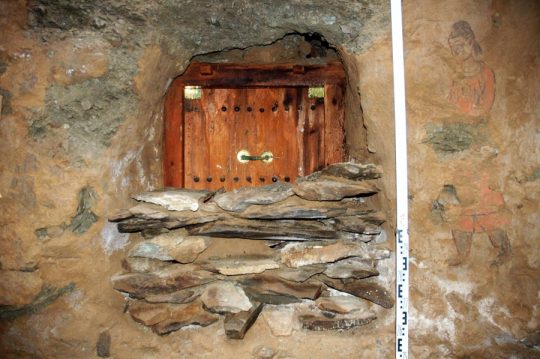
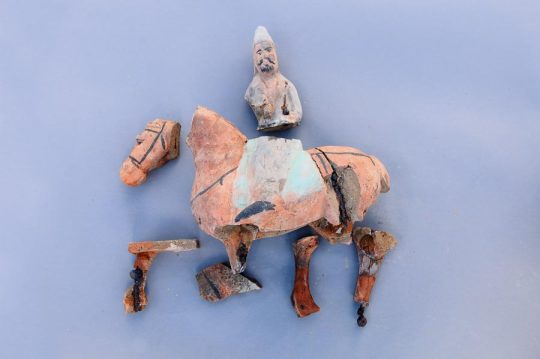
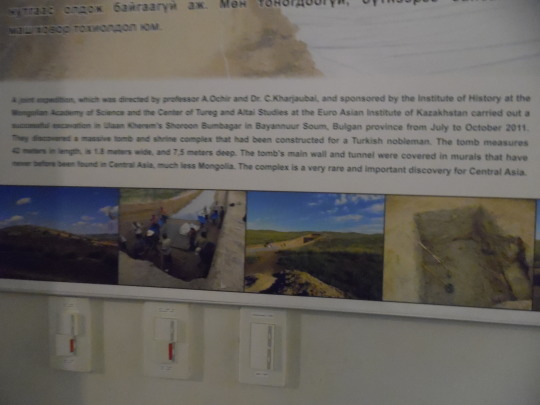
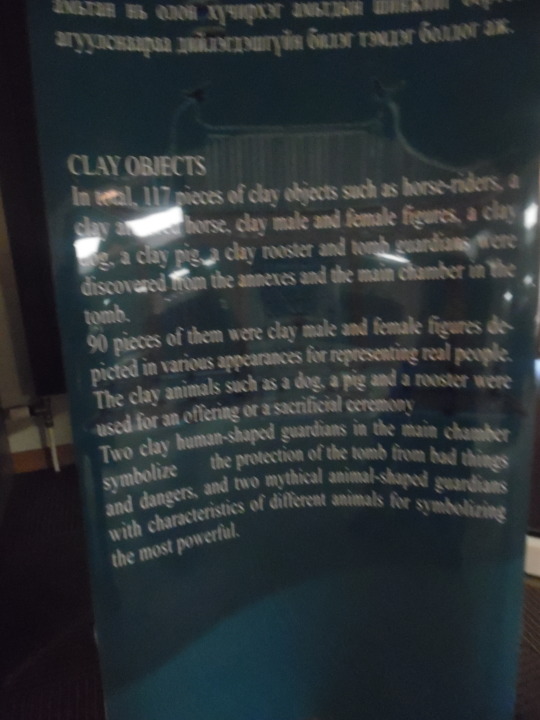

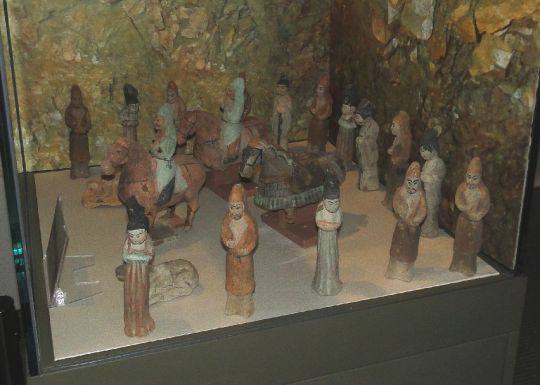
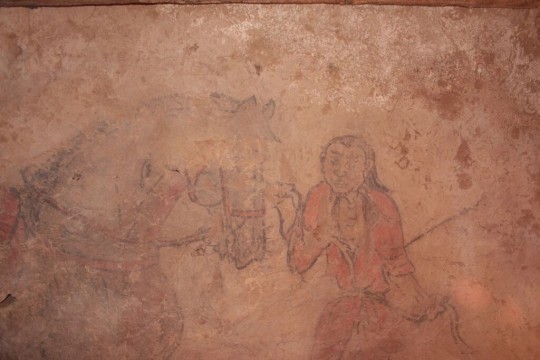
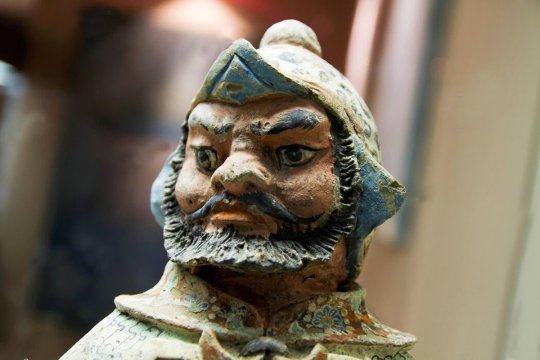
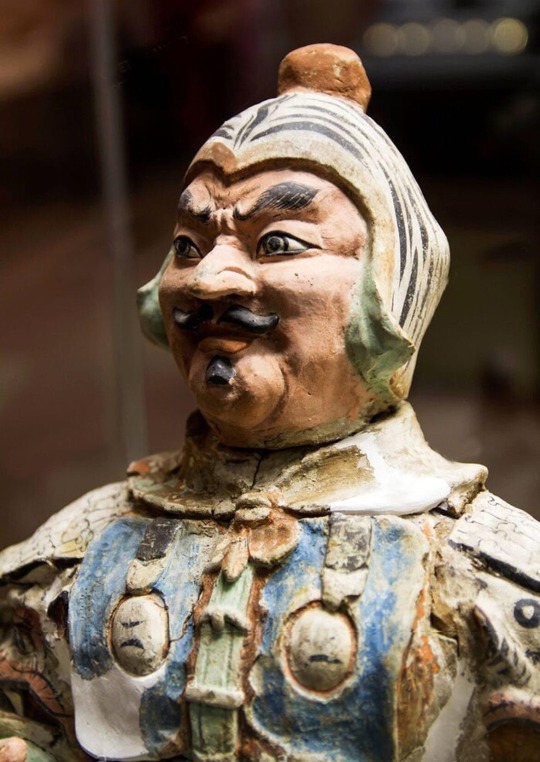
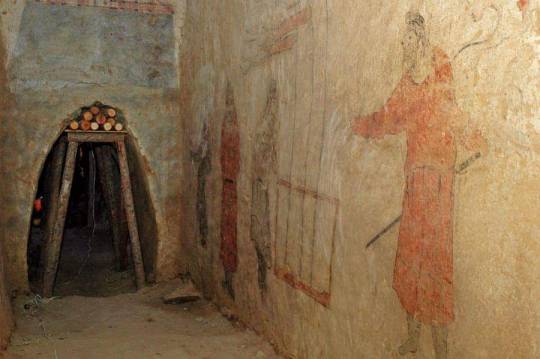
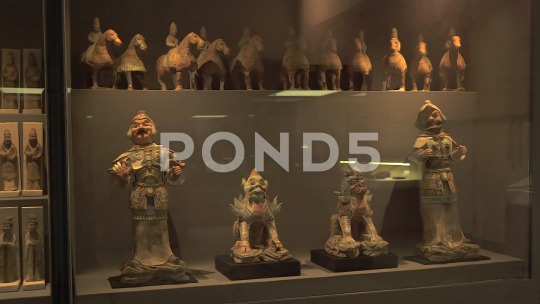
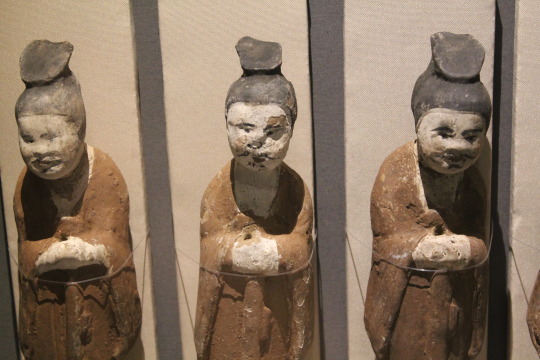
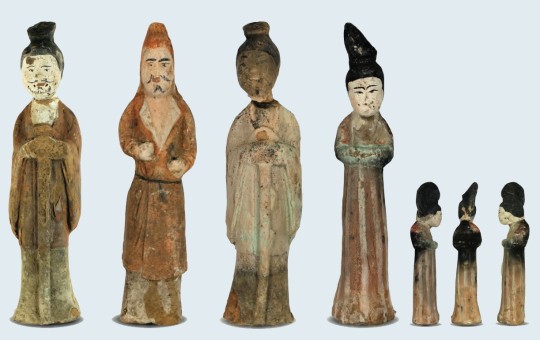
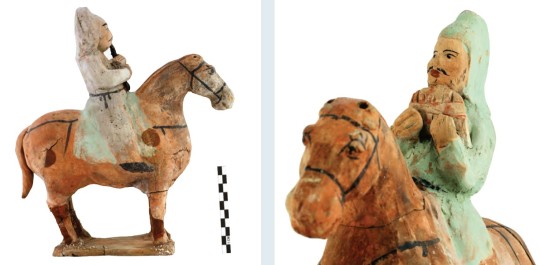
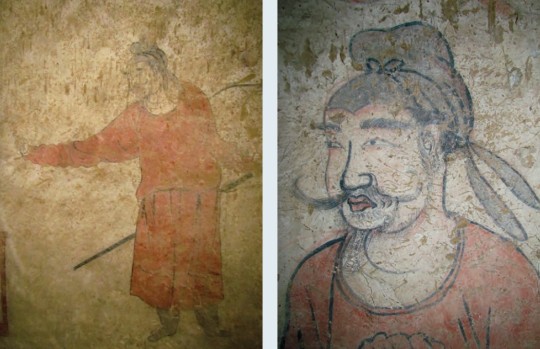
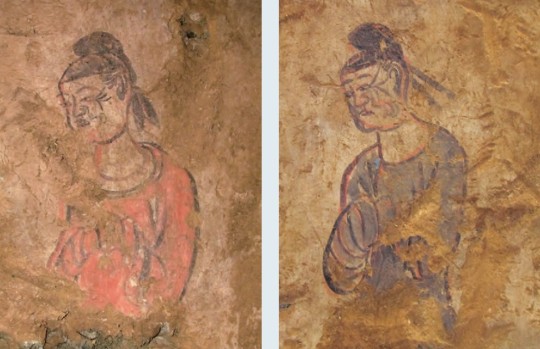


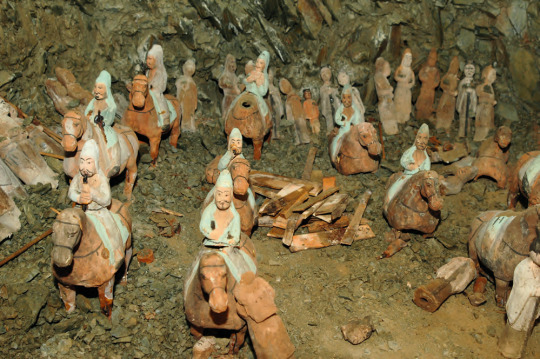




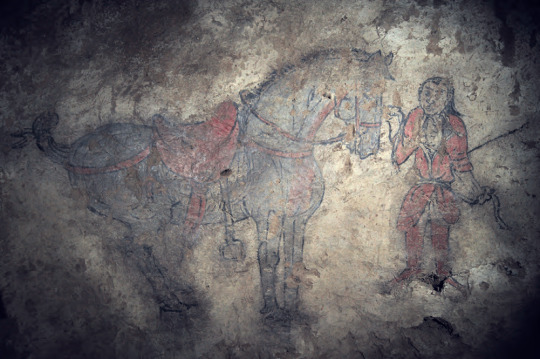
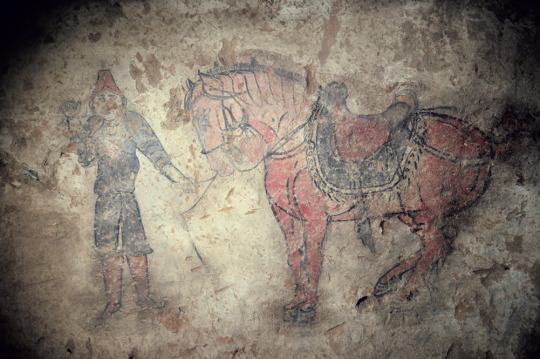
Shoroon Bumbagar, tomb of a Turkic (Gokturk) nobleman, 650-700 CE
"Like Chinese historians, Muslim writers in general depict the ‘Turks’ as possessing East Asian physiognomy. For instance, Sharaf al-Zamān Tāhir Marvazī describes them as being ‘short, with small eyes, nostrils, and mouths’ (1942: 53–4, 156). Similarly, Tabarī (d. 923) depicts the ‘Turks’ as being ‘full-faced with small eyes’ (1987: 21). In his Qābūs-nāma, the eleventh-century Ziyarid ruler Kai Kā'ūs also describes the ‘Turks’ as possessing ‘a large head (sar-i buzurg), a broad face (rūy-i pahn), narrow eyes (chashmhā-i tang), and a flat nose (bīnī-i pakhch), and unpleasing lips and teeth (lab va dandān na nīkū)’ (Kai Kā'ūs ibn Iskandar 1951a: 103; 1951b: 64). The Arab historian and geographer al-Mas'ūdī (896–956) writes that the Oghuz Turks residing in Yengi-kent, a town near the mouth of the Syr Darya, ‘are distinguished from other Turks by their valour, their slanted eyes, and the smallness of their stature’ (wa hum ashadd al-Turk ba’san wa aqsaruhum wa asgharuhum a‘yunan wa fī al-Turk man huwa aqsar min hā’ulā’) (al-Mas'ūdī 1962–: Vol. 1, 212). However, Muslim writers later differentiated the Oghuz Turks from other Turks in terms of physiognomy. Rashīd al-Dīn writes that ‘because of the climate their features gradually changed into those of Tajiks. Since they were not Tajiks, the Tajik peoples called them turkmān, i.e. Turk-like (Turk-mānand)’ (Rashīd al-Dīn Fażlallāh Hamadānī 1988: Vol. 1, 35–6; Rashiduddin Fazlullah 1998–99: Vol. 1, 31). Hāfiz Tanīsh Mīr Muhammad Bukhārī (d. c. 1549) also relates that after the Oghuz came to Transoxiana and Iran, their ‘Turkic face did not re-main as it was’ (1983: fol. 17a (text), Vol. 1, 61 (trans.)). Abū al-Ghāzī Bahadur Khan similarly writes that ‘their chin started to become narrow, their eyes started to become large, their faces started to become small, and their noses started to become big’ after five or six generations (Abu-l-Gazi 1958: 42 (text), 57 (trans.); Ebülgazî Bahadir Han 1975: 57–8). As a matter of fact, the mixed nature of the Ottomans, belonging to the Oghuz Turkic group, is noted by the Ottoman historian Mustafā Ālī (1541–1600). In his Künhü'l-ahbār, he remarks that the Ottoman elites of the sixteenth century were of mostly of non-Turkic origin: ‘Most of the inhabitants of Rum are of confused ethnic origin. Among its notables there are few whose lineage does not go back to a convert to Islam …’ (Ekser-i sükkān-i vilāyet-i Rūm meclis-i muhtelit ul-mefhūm olub ā‘yānında az kimsene bulunur ki nesebi bir müslüm-i cedīde muntehī olmaya) (Fleischer 1986: 254; Mustafā Ālī, Künhü'l-ahbār 1860–68: Vol. 1, 16)."
-Joo-Yup Lee & Shuntu Kuang, A Comparative Analysis of Chinese Historical Sources and Y-DNA Studies with Regard to the Early and Medieval Turkic Peoples
85 notes
·
View notes
Text
May Allāh reward them and increase their love for each other 🥹❤️ "And one of His signs is that He created for you spouses from among yourselves so that you may find comfort in them. And He has placed between you compassion and mercy. Surely in this are signs for people who reflect." [Sūrah ar-Rūm, Verse 21]
92 notes
·
View notes
Text


Rūm Cocktail Bar / Valdemāra pasāža
5 notes
·
View notes
Text
Brahma and its Ancient Origins

By Hossein Behzad - http://sadmu.ir/detail/5613, Public Domain, https://commons.wikimedia.org/w/index.php?curid=85573572
Jalāl al-Dīn Muḥammad Rūmī, also known as Muhammad bin Muhammad bin al-Husayn al-Khatibi al Bakhi al-Bakri, more commonly known in English as Rumi, was a Persian Islamic scholar, Sufi mystic, and poet who lived from 1207-1273. His name indicates that he was from the Sultinate of Rūm in Anatolia, which was part of the Byzantine Empire near the time of his birth. Rumi comes from a Persian word meaning 'Roman', meaning the Eastern Roman, or Byzantine Empire. His father was a preacher and jurist in Balkh, which was a major center of Persian and Sufi culture. When Rumi was five, the family moved to Samarkand due to the Mongols invasion, but Balkh had a deep effect on him through his life. He held a deep respect for Persian poets that went before him, such as Attar and Sanal, saying 'Attar was the spirit, Sanal his eyes twain, And in time thereafter, Came we in their train'. The family then settled in Karaman in Central Anatolia. There, his mother and brother died and his father remarried two more times. When Rumi was 21, the family settled in Konya at the invitation of 'Alā' ud-Dīn Key-Qobād who ruled Anatolia at the time so that his father could become the head of a religious school called a madrassa. When Rumi was 25, his father died and he inherited the position while continuing to learn under others. He traveled to Damascus and met with a dervish Shams-e Tabrizi, who had a deep influence on him. He tended to spontaneously compose poems that were collected by his followers and others. After the death of Shams, when Rumi was 40, he found another companion, Salaḥ ud-Din-e Zarkub, then Hussam-e Chalabi. Hussam encouraged Rumi to write his poetry down, that it 'would become the companion of many troubadours.' Over the next twelve years of his life, he dictated six volumes to Hussam. Many of Rumi's works talk about the love that infuses the world, which is a common thread with other mystic and Sufi poets. While he wrote about other religions, he held Islam above the others and the Quran as the ultimate truth.

By Photograph: World ImagingImage: Charles Masson (1841) - This file has been extracted from another file, CC BY-SA 3.0, https://commons.wikimedia.org/w/index.php?curid=85583318
Brahma is the Hindu creator in the supreme divinity that includes Vishnu and Shiva. The earliest mentions of Brahma probably date to the late first millenium BCE in the Maitrayaniya Upanishad. In it, 'one's Soul is Brahman, and this is the Ultimate Reality, Cosmic Universal or God is within each living being.' Brahma is often depicted with four faces that face the four directions and four arms without weapons in his hands, but rather holding symbols of knowledge and creation such as a copy of the Vedas and a mala, a loop of prayer beads, which symbolizes time.
In the poem, Rumi places the reader in the place of many parts of the world, beginning with 'I am the mote in the sunbeam, and I am the burning sun;/"rest here!" I whisper to the atom; I call to the orb, "Roll on!"' Not everything is pleasant, though, as he ads '[t]he warrior, the blade that smites him, his mother's heart-wrung tear;/I am intoxication, grapes, wine-press, and must, and wine' as well as 'I am both Good and Evil; the deed and the deed's intent,/Temptation, victim, sinner, crime, pardon and punishment'. It culminates with 'I am what was, is, will be; creation's ascent and fall;/The link, the chain of existence; beginning and end of all.'
You can read the whole poem here.
2 notes
·
View notes
Photo
I’m pretty sure this is the most I’ve learned about the Hittites and That’s Sad.







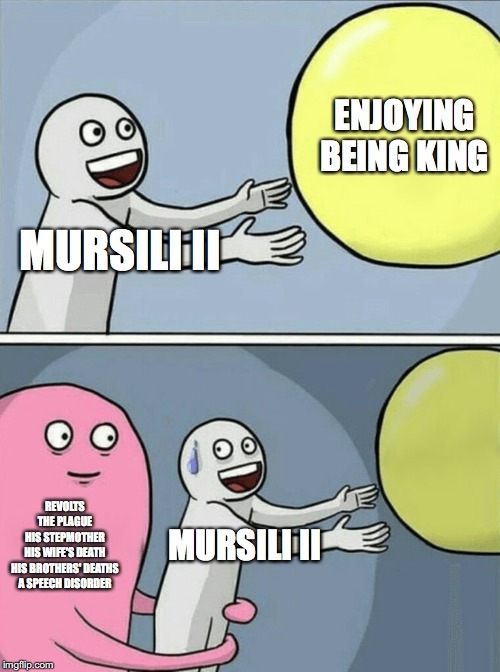

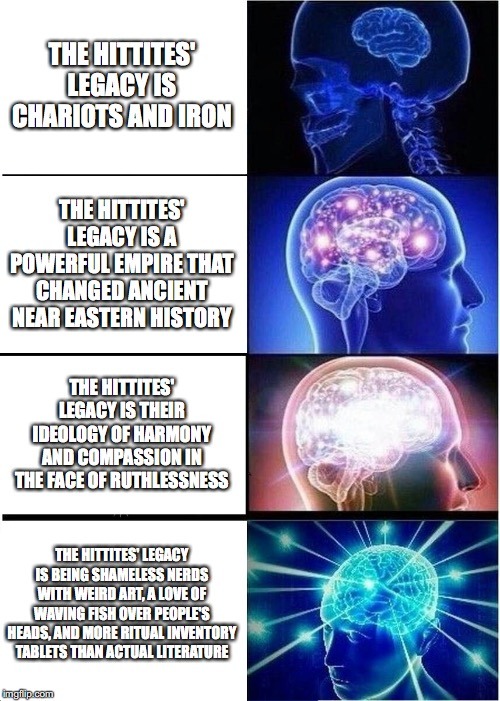
Hi, my name is sisterofiris and I’m here to provide you with extremely niche Hittite memes
7K notes
·
View notes
Text
Medieval Persian folklore includes mention of two outstanding conquerors who invaded Iran from opposite directions: Eskandar of Rum, and Afrāsīāb of Turan. Eskandar is known to be Alexander the Great ("Rūm" = "Rome" i.e. Greece). But who on earth is this Afrāsīāb person? "Turān" is the old Persian name for the Central Asian steppe. But we know nothing of the Achaemenids' dealings with the people on their eastern borders; almost all of our knowledge comes from Greek writers who focused on the western portion of the empire. Some think that Afrāsīāb is a fictional character (like another villain of the Shahnameh: the demon-king Zahhāk, who derives from the mythical dragon Aži Dahāka). But I think it's also possible that he was a real person—perhaps some Scythian warlord—who fought against Persia and was remembered for it in Persian mytho-history. A good comparison here is with Attila the Hun, another would-be conqueror from the steppe. Like Afrāsīāb, Attila was remembered and commemorated in the folk traditions of the local people—in this case, Germanic poems like Widsith, the Nibelungenlied, and the Poetic Edda. The difference is that in Attila's case, we also have contemporary, reliable historical accounts which historians can use to corroborate (or not) the references to Attila in poetry: no need to uselessly speculate on who this mysterious "Atli" figure was or whether he existed. No such corroborating witness exists for Afrāsīāb. So we can't even know if he was real or mythical.
A modern Persian wanting to learn about the earliest history of his or her civilization is much better served by reading Herodotus than Ferdowsi. Likewise, a modern Greek is going to get much better information about earliest Greece from the records of the Egyptians and Hittites than from the poetry of Homer. Adopting a discerning eye towards different sources of historical evidence often means that the most accurate and reliable history of a culture doesn't come from that culture at all, but from outsiders—this is a point which modern commentators of Native American history often don't want to accept. Who knows the most about the early Alaskan Tlingit? People who can read Russian, that's who. The flipside, however, is that when documentation for a period is sparse, people can start to confuse lack of evidence for lack of incidence: "we don't know a lot about the eastern Persian Empire, so not a lot must have happened." But that's not going to be the perspective of someone from ancient Persia—certainly not if they're from one of the eastern satrapies after their village has been sacked. To assume that everything of significance that happened in Persia happened with Greece is to make the same mistake as that critic ("What is this to me, the duel between Iran and Turan?"). Modern histories of Persia ignore Afrāsīāb; they can only go where the evidence takes them. But the Shahnameh apparently puts Afrāsīāb on roughly the same level as Eskandar—that fact might (might!) be a clue that something big did happen out on the eastern Persian frontier, which could be compared to Alexander's invasion. Maybe. The record is silent.
Trying to reconstruct the history of the frontier-beyond-the-frontier is a tricky business. Sometimes you get lucky, like with the Kiowas (on whom more in a future post): where written history, oral history, archaeology, linguistics, and winter counts all come together to form a coherent picture of the Kiowa past which reaches back a thousand years. And sometimes you get unlucky, like with the Arapahoes, who are invisible to the archaeological record and whose early history is a giant mystery. And then there are enigmas, like the Suhtai, on whom all a person can really do is guess. All of this is of course highly relevant to any attempt at making a map of peoples who lived beyond the reach of recorded history. Crumbs... And as for the Bloody Falls Massacre: the Wikipedia article tells me that "in 1996, Dene and Inuit representatives participated in a healing ceremony to reconcile the centuries-old grievance." I can't really argue with that, I suppose. Healing is good, reconciliation is good. But it is hard to hold a healing ceremony for a massacre that nobody remembers. Did you take notice of the fact that it has a name: "the Bloody Falls Massacre"? Why? Who named it that? Do you suppose it would it have a name, or be remembered at all, among the Chipewyans, still to this day, after 248 years, if no one had been there to write it down? Perhaps... but I'm inclined to think likely not. It was just one raid, after all. One among thousands of sanguinary struggles that took place on the lonely tundras, of which the world knows not.
5 notes
·
View notes
Text

Bilād al-Maghrib, Dhul-Hijjah 1444, Atlantic coast
True Dreams in the Qur'an
وأما الآية التي أوردها فهي قوله -تبارك وتعالى-: وَمِنْ آيَاتِهِ مَنَامُكُمْ بِاللَّيْلِ وَالنَّهَارِ [الروم:23]، ووجه تعلق هذه الآية بموضوع الرؤيا هو: أن النوم آية من آيات الله -تبارك وتعالى-، وذلك أن الإدراك والشعور يرتفع فيه، مع أن ال��وح لا تفارق البدن مفارقة تامة، كما هو في الموت، وإنما يبقى لها تعلق بالجسد، لكنه يرتفع معه الإدراك، فهذه الروح لها أحوال، وتنقلات، وتحولات، وأمور غيبية لا ندركها، فتنتقل في الملأ الأعلى، وترى أمورًا في نومها، قد تكون من الله.
As for the verse he mentioned, it is His saying - عز و جل - the Blessed and Exalted -:
} And among His signs is your sleep during the night and the day [Ar-Rūm: 23], {
and the way this verse relates to the subject of dreams is: that sleep is a sign of Allāh - the Blessed and Exalted -, and that is the perception of feeling risen, although the soul does not leave the body completely, as it happens with death, but it remains attached to the body, but perception rises with it, for this soul has conditions, transitions, transformations, and unseen matters that we do not grasp or understand.
So it moves in the highest assembly (Heaven, the world of Angels), and sees things in its sleep, which are from Allāh.
#tafseer#ahlulhadith#ahlulsunnah#quran&sunnah#islamicreminder#islampost#sunnah#salaf#manhaj salaf#deenislam#understanding your deen#deenoverdunya
13 notes
·
View notes
Text
if you go to Pergamum you HAVE to tell me if you met a mini-pinscher type stray dog (small, black, and very athletic) with red ticking on her legs. she was my tour guide and I want to know how she’s doing out there
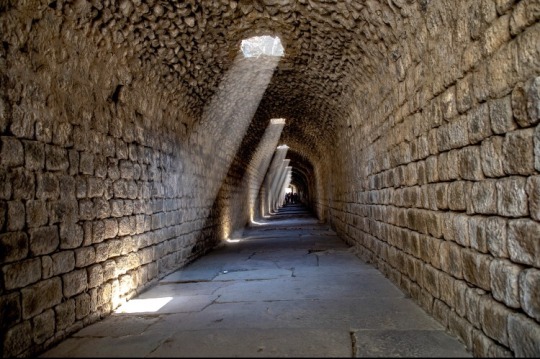
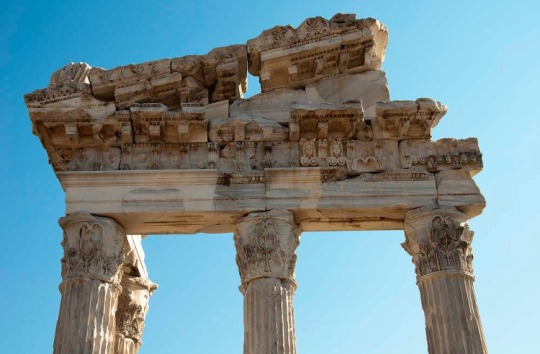
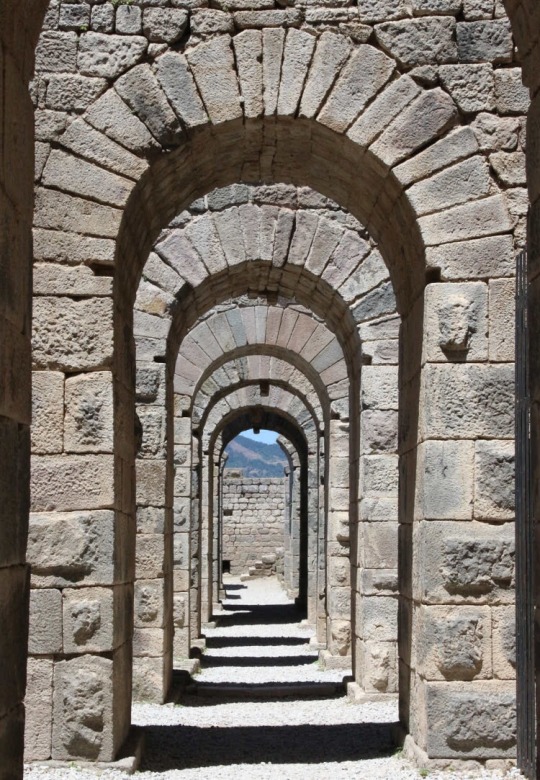
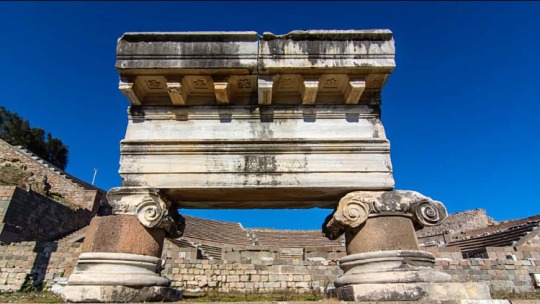
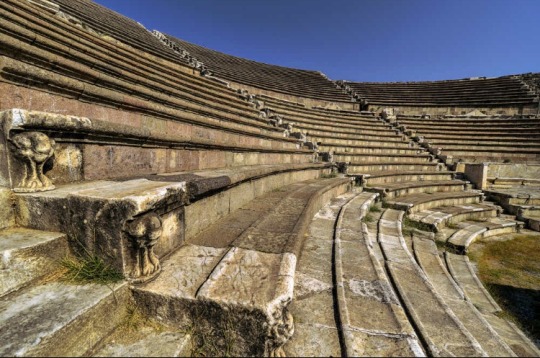
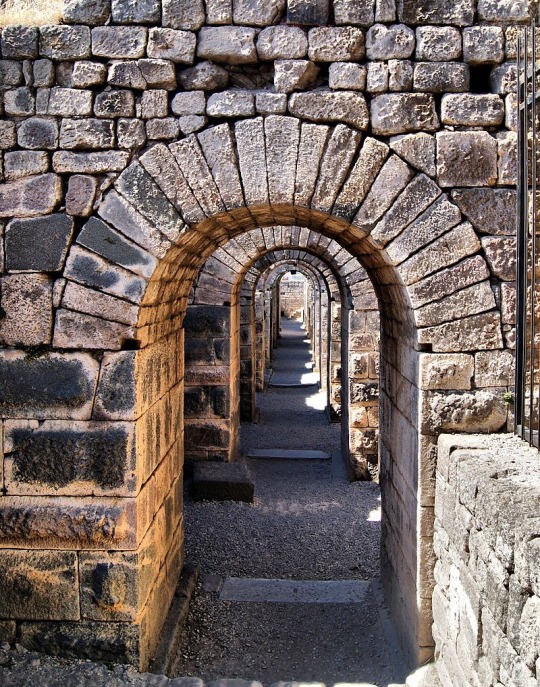
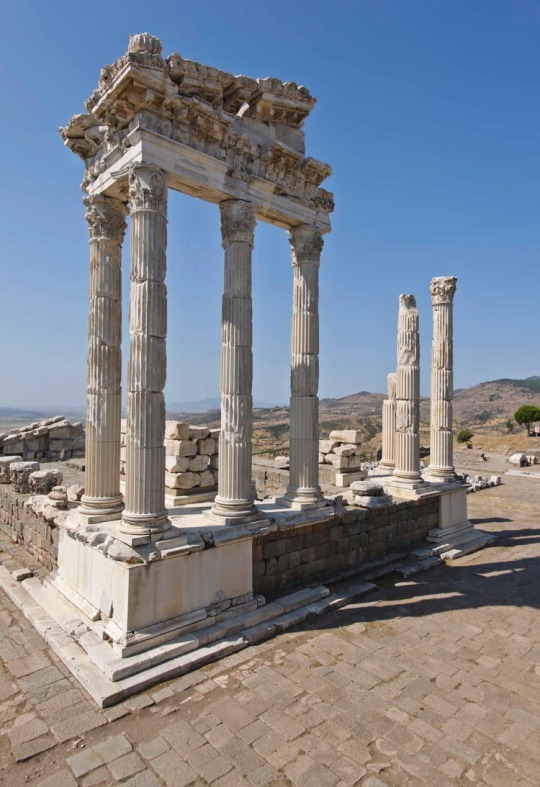
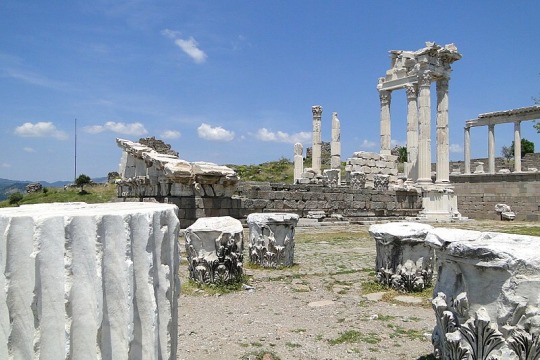
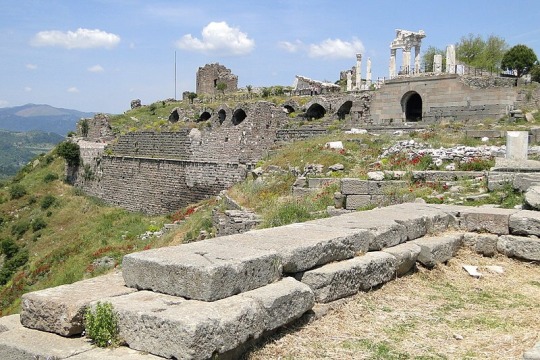
Pergamum was located in the northwest of Asia Minor (present day Turkey) was a cosmopolitan city, cultural meeting of the Roman Empire. In 2014, Unesco chose Pergamum as a World Heritage Site.
817 notes
·
View notes
Text
#Nîkāh
SubhānAllāh, there are many strangers on Tawhīd who are striving very hard & are doing it tough.
Despite the headaches, problems and huge responsibilities, marriage is a blessing which these strangers will cherish, especially when you finally get to be with someone who understands you & follows your 'Aqīdah.
Allāh عزوجل says:
❝And of His signs is that He created for you from yourselves mates that you may find tranquillity in them; and He placed between you affection and mercy. Indeed in that are signs for a people whogive thought.❞ [Sūrat al-Rūm;Āyah 21]
Allāh has blessed us with people of different colours and languages, as muslims we disbelieve in nationalism:
Allāh عزوجل also said:
❝And of His signs is the creation of the heavens and the earth and the diversity of your languages and your colors. Indeed in that are signs for those of knowledge.❞ [Sūrat al-Rūm; Āyah 22].
May Allāh fill the hearts of the غرباءَ [Strangers] with Ēmān & grant them righteous company in this World and the Next, and expiate their sins through whatever hardship they face And raise their ranks to firdous Amim.
Allāh is with the patient, In shā' Allāh whenever Allāh decrees, He will bless you with a spouse who can look after you, hide your faults & strengthen your relationship with your Lord.
7 notes
·
View notes